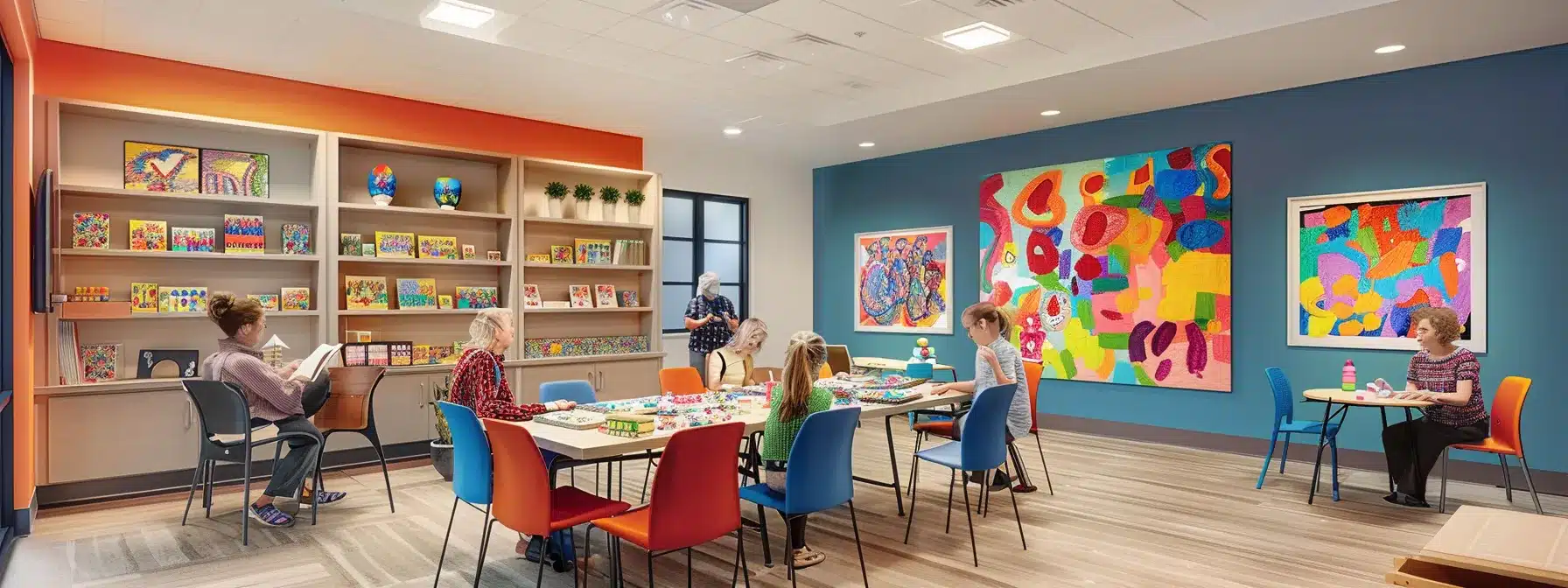Secure the best affordable memory care community wallingford pa. Learn about costs, funding, and how to choose quality dementia support.

Insights on Alzheimer Care Facilities in Michigan
Table Of Contents:
- Understanding Daily Life in Alzheimer Care Facilities Across Michigan
- Key Takeaways
- Daily Activities in Alzheimer Care Facilities in Michigan
- Staff Interaction and Caregiver Roles
- Environmental Design and Its Impact on Daily Life
- Nutrition and Meal Planning
- Health Monitoring and Emergency Preparedness
- Family Engagement and Support Systems
- Quality of Life and Resident Well-Being
- Frequently Asked Questions
- Conclusion
Understanding Daily Life in Alzheimer Care Facilities Across Michigan
Are you looking for clear insight into daily activities in Alzheimer care facilities across Michigan? This post covers staff interaction, daily routines, and support systems that improve well-being. Readers will gain practical tips on how these facilities address common concerns in dementia care. The content directly answers everyday challenges, offering clear examples from facilities that focus on personalized care.
Key Takeaways
- structured routines support both physical and mental well-being
- creative art sessions and nature outings reduce daily anxiety
- tailored meal planning meets unique nutritional needs
- ongoing staff training ensures practical and empathetic care
- family collaboration improves scheduling and overall support
Daily Activities in Alzheimer Care Facilities in Michigan

Structured routines support primary care and blend engaging activities such as creative art sessions, outdoor nature outings on wheelchair-accessible paths, and social opportunities. Residents also benefit from income management support and facility license standards similar to those in wisconsin, ensuring a balanced daily life that meets health and social needs.
The Importance of Structured Routines
Structured routines in Alzheimer care facilities ensure residents receive timely personal assistance and social interaction while reducing potential risk associated with unsupervised periods. A well-organized schedule is crucial for assisted living residents, especially those residing in areas identified by a particular zip code, as it supports both physical and mental well-being through consistent activities and reliable fee structures that maintain service quality.
Daily activities that follow a set routine provide consistent nutrition education sessions and interactive engagements, which are essential in managing health conditions common in Alzheimer care environments. This organized approach helps residents easily anticipate their day, promoting confidence and reducing anxiety in an assisted living setting while addressing practical needs through scheduled support services.
Types of Engaging Activities Offered
Residents in this memory care facility experience daily programs that focus on both physical and social skills. These programs include memory-care-services, offering creative art sessions and light outdoor events that support a veteran’s and patient’s need for structured routine, while also assisting those under medicaid support through personalized interactions.
Engaging activities are designed to foster a sense of belonging and empowerment. The approach incorporates interactive sessions and group discussions that help ease daily challenges, ensuring that each patient, including veteran members of the community, benefits from trustworthy memory-care-services.
Outdoor Activities and Nature Outings
Residents participate in outdoor excursions that incorporate visits to a nearby lake and well-designed village pathways. These outings serve as an asset to daily routines by providing a calm setting and physical engagement while reducing the risk of emergency situations.
The facility organizes outdoor activities that empower residents to engage with nature and explore scenic routes resembling those in indiana. A typical day might include a guided walk through a charming village area that leads to a refreshing lake view, offering a structured environment for relaxation and social interaction, as illustrated by the following examples:
- Wheelchair-accessible paths
- Guided nature tours
- Social gathering spots
Creative and Artistic Programs for Residents
The facility offers creative art sessions that help residents manage stress and cope with disease symptoms, providing a supportive environment that addresses practical needs including proper diet management and routine care. Residents are encouraged to share their feedback via email address while ensuring appropriate consent is obtained for participation in all activities:
- Art therapeutic sessions
- Interactive painting classes
- Collaborative crafts projects
These artistic programs enhance mental engagement and physical activity, supporting well-being through senior-focused exercises and mindfulness techniques that address everyday diet and stress concerns. Each initiative is designed with first-hand expertise, ensuring that residents with disease-related challenges benefit from structured creative expression while maintaining proper consent protocols.
Social Interaction Opportunities
Social interaction opportunities in Alzheimer care facilities foster a sense of community and require constant attention from health professional teams, ensuring residents receive individualized support and guidance, similar to trusted practices observed in north dakota settings:
- Group discussions led by experts in regulatory affairs
- Community events that incorporate practical tips for managing tax credit benefits
- Support sessions that focus on building mutual trust
These initiatives help residents feel engaged and supported, with each activity structured to encourage positive interactions and strengthen personal connections within the facility’s environment.
The daily routines set the stage for the devoted team. The caregivers work side by side, each touch giving meaning to care.
Staff Interaction and Caregiver Roles

Staff training and caregiver qualifications shape daily dementia care, integrating waiver protocols, legal aid, and mortgage advice from trusted sources like AARP. Approaches to daily dementia care emphasize family and caregiver collaboration alongside consistent trust-building with residents. Each focus area is crucial for delivering practical, effective support in Alzheimer care facilities across Michigan.
Staff Training and Qualifications in Dementia Care
The memory care home emphasizes a rigorous philosophy that underpins all staff training, ensuring every caregiver is equipped with the practical skills necessary for superior elderly care and effective home care support. This system of ongoing education provides actionable insights for managing daily challenges in dementia care facilities across Michigan.
Staff training programs combine first-hand expertise with structured evaluations to uphold standards in caregiver performance and memory care practices:
Staff qualifications ensure that every caregiver operates with precision and empathy, fostering confidence among residents and their families.
Approaches to Dementia Care in Daily Life
Staff at Memory Lane Assisted Living apply proven approaches to dementia care by providing consistently planned meals, which not only support healthy brain function but also stabilize behavior. Their expertise in Grosse Pointe communities helps create a nurturing environment that addresses the unique needs of each resident.
The dedicated team builds care routines that integrate physical nourishment and mental engagement, ensuring that every meal aligns with the needs of the residents’ overall health. Through hands-on methods and personalized attention, Memory Lane Home fosters a supportive atmosphere that improves memory and daily interactions.
The Role of Family and Caregiver Collaboration
Family members work closely with caregivers to create schedules that support memory retention and ensure accurate medication management. Their involvement often eases concerns related to retirement planning and property tax issues, a need observed in various care settings including illinois communities.
Collaboration between family and caregivers builds a network of support that improves the overall quality of daily life in assisted living. This cooperative approach, which addresses both routine and emergency needs, results in better care and consistent updates on medication administration and memory care practices:
- Regular meetings to review care plans
- Joint scheduling of retirement and property tax consultations
- Coordinated efforts to monitor medication and memory care progress
Building Trust and Communication With Residents
The staff at memory care homes prioritize building trust through clear communication and personalized attention to residents’ daily needs, including nutrition and hygiene, which directly influence overall quality of life and health insurance benefits:
The caregivers use practical approaches and real-life examples to foster open dialogue with residents, ensuring that questions about daily routines or health insurance coverage are addressed promptly, which further upholds the quality of life in these facilities.
Staff members work with clear intent and steady care. The well-considered space that surrounds them brings a calm clarity to every day.
Environmental Design and Its Impact on Daily Life

Alzheimer care facilities in Michigan benefit from smart environmental design that supports navigating spaces, sensory-friendly areas, effective signage, and familiar settings for residents. This section covers practical approaches useful in residential care. The importance of clear layouts is highlighted alongside topics such as nursing, volunteering, power of attorney matters, and even practices seen in south carolina facilities.
Navigating Spaces in Alzheimer Care Facilities
Memory Lane Assisted Living designs its spaces to support activities of daily living with careful attention to layout and accessibility. The facility incorporates features that benefit physical therapy sessions and daily routines similar to those seen at the University of Michigan, ensuring residents navigate safely and efficiently.
The design also draws on practices observed in regions like Fort Gratiot, which emphasize ease of movement and clear wayfinding for residents. This practical approach extends to interaction models that resemble foster care environments, creating a secure and user-friendly setting tailored to the needs of those with memory care challenges.
Sensory-Friendly Environments
Sensory-friendly environments in these facilities create a calm and secure setting, supporting alzheimers-care initiatives and aiding staff in managed care practices. This environment provides a structured approach to daily routines while ensuring that first aid practices and clear layout designs promote accessibility for geriatrics, making it a place for mom to feel understood and cared for.
The design of sensory-friendly areas prioritizes soft lighting and familiar colors which help reduce confusion and anxiety, ensuring residents engage safely in daily tasks. With practical insights from daily operations, the facility integrates features that support alzheimers-care while reinforcing essential first aid standards and managed care protocols, establishing a place for mom that meets each resident’s unique needs in a straightforward, respectful manner.
Signage and Wayfinding Strategies
Memory Lane Assisted Living employs clear signage and intuitive wayfinding techniques informed by recent research, ensuring a safer environment for individuals with dementia. The careful design promotes accessibility, drawing insights from practices in Wyoming and Ottawa to create spaces that support independent movement and reduce disorientation.
The facility’s approach to signage focuses on consistency and legibility, which aids in calming residents and easing daily navigation. By integrating practical cues and reliable markers, the center sets a standard that aligns with both expert research and proven strategies, enhancing the daily experiences of its residents.
Creating Familiar Spaces for Residents
Memory Lane Assisted Living creates familiar spaces where residents feel secure and at ease, integrating clear signage and consistent layouts that promote safety and comfort. The design also addresses practical matters by connecting residents with local ombudsman services, health care support, and information on reverse mortgage options for additional financial guidance.
Residents experience a sense of home through thoughtful interior design that includes easily navigable areas and calming spaces reminiscent of home environments. The facility also supports community needs by offering links to local food bank resources and clear instructions on safety protocols and health care services.
The careful setting that shapes everyday life now leads to a new focus: the food that fuels well-being. In the next part, nutrition and meal planning take center stage as the heart of a healthy routine.
Nutrition and Meal Planning

The facility offers clear daily meal options in dementia care while addressing special dietary needs and keeping a careful ratio of nutrients amid inflation trends. Mealtime serves as both a social opportunity and a chance for respite care engagement. Estate planning and practices similar to those in Iowa further ensure nutritional adequacy and individualized attention.
Daily Meal Options in Dementia Care Facilities
Daily meal options at dementia care facilities feature a variety of nutrient-dense choices to meet residents’ balanced dietary needs. A nonprofit organization often participates in regular inspection and consultation with a physician to ensure that meal plans align with standards set by the michigan department of health and human services, delivering both quality and safety in each offering.
The retirement home maintains a menu that supports health and wellness, drawing on insights from experienced caregivers and nutrition experts. Strategic meal planning integrates input from a physician and complies with rigorous inspection criteria, enabling residents to enjoy meals that assist in managing their dietary requirements effectively.
Special Dietary Needs and Considerations
Special dietary needs in Alzheimer care facilities require precise meal planning that meets individual health requirements while considering practical aspects such as nutrition guidelines set by the county, protocols in a kentnursing home, and fire safety standards during meal preparation and service:
Attention to special dietary needs ensures residents at the nursing home receive meals that support their well-being and minimize risks, incorporating elements of fire safety into daily routines to protect health and the environment.
The Role of Mealtime in Social Engagement
Mealtime in these Alzheimer care facilities serves as a key opportunity for social engagement, where residents connect over shared dining experiences and practical health practices. The organized dining period fosters interactions that support both nutritional balance and emotional well-being in a community setting.
The dining environment is structured to encourage conversation and mutual support among residents, creating a space that nurtures practical social connections. Staff and caregivers use these moments to observe residents’ needs, ensuring that mealtime becomes both a nourishing and socially engaging part of daily life.
How Facilities Ensure Nutritional Adequacy
Facilities employ tailored meal plans that incorporate balanced nutrient profiles and regular input from experienced caregivers and nutrition experts. They work with medical professionals to review each resident’s specific dietary requirements, ensuring that meals consistently meet health standards and support overall wellness.
Practical strategies such as routine consultations with nutrition specialists and adjustments based on resident feedback help maintain meal quality and safety. This approach delivers nutritional adequacy while easing concerns for families, as it reflects a commitment to supporting both physical health and daily living needs.
Meals fuel the body, steady and reliable as a well-built structure. Next, attentive oversight and swift response become the foundation of care, preparing for any sudden need.
Health Monitoring and Emergency Preparedness

Daily health checks and medication management are central to Alzheimer care. Emergency protocols provide clear response plans for unforeseen events, while effective health communication between staff and families ensures timely updates. This section outlines these critical areas with straightforward, practical insights that promote safety and well-being in care facilities across Michigan.
Daily Health Checks and Medication Management
Memory Lane Assisted Living conducts daily health checks to ensure that each resident’s physical condition is closely monitored, reducing risks associated with memory care settings. Staff members use practical approaches for medication management, reviewing dosing schedules and consulting with medical professionals to maintain a stable health routine in Michigan facilities.
The facility follows strict protocols for daily health checks and medication management to support residents’ well-being. This organized method allows caregivers to promptly address health concerns and adjust medication plans, creating an environment that prioritizes safety and effective care in Alzheimer care settings.
Emergency Protocols in Alzheimer Care Facilities
In Alzheimer care facilities across Michigan, emergency protocols are clearly outlined to ensure residents receive swift and effective support during unexpected events. Trained staff members follow established procedures that prioritize resident safety, using practical steps to manage emergencies and deliver timely care.
The facilities maintain communication channels with local emergency services and family members, offering immediate updates when incidents occur. This well-organized approach is based on hands-on expertise and a commitment to consistent safety measures in daily care operations.
Health Communication Among Staff and Families
Staff members at Memory Lane Assisted Living maintain clear, direct channels of health communication with family members to ensure that updates on residents’ conditions are shared promptly. This practice minimizes delays in addressing concerns and reinforces confidence in the facility’s ability to deliver timely care in daily routines.
Regular communication sessions between staff and families allow for the sharing of practical insights about residents’ health progress and emergency protocols. These interactions provide families with precise information and reports, which support decision-making and strengthen the overall safety measures within the care facility.
A trusted team saves lives and keeps watchful eyes on emergencies. Care from family and friends now grows into a strong support network.
Family Engagement and Support Systems

Family engagement programs invite close participation, offering resources for residents’ families. Support groups and counseling services provide ongoing guidance. These initiatives create structured opportunities for valuable family-centered involvement, reinforcing daily care and overall well-being at Alzheimer care facilities across Michigan.
Programs Involving Family Members
Memory Lane Assisted Living offers tailored family engagement programs that provide families with consistent updates and direct involvement in daily activities. The facility’s approach focuses on practical insights and actionable guidance, ensuring that family members clearly understand care routines and support strategies.
The center organizes specific events that enable family members to actively participate in care planning and social activities with clear communication and scheduled sessions:
- Regular care planning meetings
- Interactive family support groups
- Personalized care update sessions
These programs are designed with hands-on expertise, streamlining collaboration and building confidence among families to ensure high-quality care delivered every day.
Resources for Families of Residents
Memory Lane Assisted Living provides comprehensive support programs designed to assist families in understanding the daily life of their loved ones. Families receive prompt updates, hands-on guidance, and detailed resources that ensure they remain well-informed about every aspect of Alzheimer care in Michigan facilities:
Families also benefit from access to expert consultations and informational sessions that address common concerns and simplify decision-making. These practical resources are tailored to the needs of each family, making it easier to navigate the challenges associated with Alzheimer care while maintaining peace of mind.
Support Groups and Counseling Services
Memory Lane Assisted Living organizes regular support groups and counseling services tailored to families navigating Alzheimer care. These sessions empower families with practical advice and first-hand expertise, ensuring they feel confident in addressing daily challenges and coordinating care for their loved ones.
Counseling sessions provide a safe space for families to share experiences and receive guidance from trained professionals. The facility’s approach emphasizes clear and compassionate communication, offering actionable steps that help families manage the stress and complexities of Alzheimer care effectively.
Families share honest moments that spark hope in their loved ones. The warmth of these visits adds a layer of joy that shows up in every resident’s smile.
Quality of Life and Resident Well-Being

Measuring quality of life in Alzheimer care involves personalized care plans that cater to individual needs, structured activities that boost emotional well-being, and regular feedback from residents and families. This approach ensures every resident’s experience remains focused on care quality, health, and day-to-day satisfaction in Michigan facilities.
Measuring Quality of Life in Alzheimer Care
Alzheimer care facilities in Michigan use clear metrics to assess quality of life by monitoring daily routines, resident participation in structured activities, and overall health improvements:
Regular assessments provide practical insights into resident satisfaction and the effectiveness of daily care routines in supporting overall well-being. This systematic evaluation not only offers clear, actionable data but also supports continuous improvements in dementia care practices across the state.
Personalization of Care Plans for Individual Needs
Memory Lane Assisted Living customizes care plans to address each resident’s unique requirements by working closely with healthcare professionals and family members. The center develops individual schedules based on specific health benchmarks and routine needs, resulting in improved daily well-being and confidence in Alzheimer care:
The facility offers practical insights into personalized planning by utilizing straightforward strategies that match resident feedback with care priorities. This tailored approach supports optimal health, ensuring that every resident benefits from a care plan that directly addresses individual concerns and daily challenges.
Activities That Enhance Emotional Well-Being
Activities such as guided group discussions and interactive art sessions play a vital role in boosting residents’ emotional well-being at Memory Lane Assisted Living. These structured programs support mental engagement and provide practical benefits, including a reduction in isolation and an improvement in overall mood:
- Therapeutic art workshops
- Group conversations with caregivers
- Tailored mindfulness exercises
Practical daily routines, including music sessions and simple physical exercises, help residents maintain emotional balance and confidence. The facility carefully plans these activities to meet individual needs and guarantee that every resident experiences a sense of belonging and support throughout the day.
Feedback From Residents and Families on Care Quality
The facility records clear and regular feedback from residents and families, ensuring that each experience is considered in their daily care routines. Their input provides practical insights that support improvements in care quality and personalized service:
Responses from residents and family members are carefully reviewed to ensure that care plans remain practical and effective for those living with Alzheimer’s. Their detailed comments lead to actionable changes that prioritize overall well-being and streamlined daily living in the assisted living environment.
Frequently Asked Questions
What daily activities benefit residents in Alzheimer care facilities?
Memory Lane Assisted Living sees activities like coordinated walks, memory games, artistic expressions, and group discussions support residents by building cognitive links, physical stability, and emotional comfort for individuals living with Alzheimer’s.
How do caregivers support residents each day?
Caregivers routinely plan engaging activities, offer compassionate assistance, and promote health and wellness through structured routines designed for each resident’s needs. They incorporate person-centered care to improve quality of life and foster trust.
How does facility design affect daily routines?
Facility layout directly influences daily routines by promoting ease of movement, ensuring safe navigation, and fostering an environment conducive to personalized care for residents with dementia and Alzheimer’s disease.
What role does nutrition play in resident care?
Proper nutrition supports overall health, boosts mental clarity, and strengthens immunity. In the residential care setting, residents benefit from balanced meals tailored to their unique requirements, promoting cognitive well-being and maintaining a high quality of life.
How are families supported through care engagement?
Families receive continuous support through personalized care engagement involving routine updates, collaborative care planning, and access to specialized memory care services in an assisted living setting that prioritizes comfort and a home-like environment.
Conclusion
Understanding daily life in Alzheimer care facilities emphasizes the value of personalized routines and comprehensive support systems. Practical activities and structured schedules foster physical health, mental well-being, and social engagement for residents. Effective staff training and clear communication channels ensure that every resident receives precise, effective care. This focus on everyday experiences solidifies the significance of tailored, compassionate care in maintaining quality of life across Michigan facilities.


